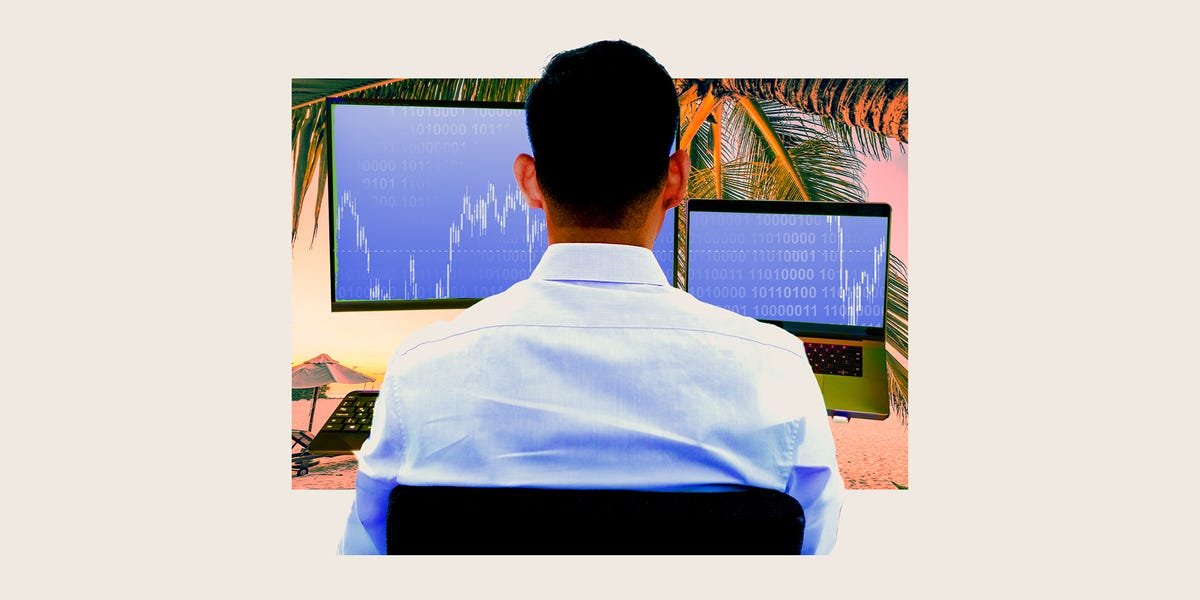Somewhere in Bali, a group of investors — mostly men — file through the gates of a luxury villa, replete with tiki huts and couches by the poolside. This isn’t just a vacation, they say. The goal, in part, is to make tons of money, Aaron Luce, the leader of the weeklong retreat for day traders, tells the camera.
“This is a beautiful pool spot. We’re all going to be chilling for the week when we make loads of money trading,” Luce says in a YouTube video documenting the experience, which includes a montage of traders looking at candlestick charts and, intermittently, taking breaks and cannonballing into the pool.
This kind of retreat is a relatively new phenomenon, offered to traders looking for an edge amid the explosion of interest in the stock market since the pandemic.
In recent years, a cottage industry has taken root amid the hype for stock trading. Social media is rife with businesses offering courses, getaways, one-on-one coaching, and other services that claim to improve traders’ performance and get them in the right mindset to turn a profit.
And demand, evidently, is booming — in large part due to traders who are swinging to go full-time, desperate to improve, or, in some cases, are simply bored, sources in the space told Business Insider.
The industry offering these kinds of services to day traders swelled to around $1.68 billion in 2024, and is on track to grow 11% each year to hit $3.92 billion in 2033, according to one estimate from Business Research Insights. A separate analysis from Dataintelo Consulting estimated that the market was valued at around $2.5 billion in 2023, and is on track to more than double to $5.8 billion by 2032.
Google search interest in “Day trading courses” is up 10% over the past year, according to data from the Google Trends analytics tool Glimpse. Searches for “Trading retreat” and “Trading coach” are up 26% and 69% over the past year, respectively, while interest for “Trading therapist” has skyrocketed 263%.
On Coursera, enrollment in online trading courses soared 213% in the five years leading up to 2024, according to data the online course provider shared with Business Insider.
The online trading platform Webull also says it’s seen the number of users on its learning platform grow 37% over the last 3 years.
International Day Trading Academy, a trading school that offers courses and an eight-day trading retreat in Bali, says interest in the retreat has exploded three or fourfold in the past year, according to Kelly Lowry, the general manager.
Courtesy of International Day Trading Academy
Andrew Menaker, a psychologist and a trading coach who frequently works with retail traders, says he’s also noticed a big push among the retail crowd to get in the right mindset for trading.
The number of people who have inquired about Menaker’s coaching services has about doubled in the past year, he said, adding that the waitlist to nab an appointment with him can range from several weeks to several months.
Menaker says some of his clients, who are willing to do just about anything to gain an edge, have said they spent upward of $10,000 on materials like indicators, charting packages, and online courses. Others have said they’ve spent money on things like cold plunges, heart biofeedback devices, brain wave devices, and even psychedelics.
Menaker is skeptical of some of the businesses selling to day traders. The space has become flooded with hype and influencer marketing, he says, especially targeting new traders who are just learning the ropes.
“It’s really a buyer-beware environment,” he said.
A trader’s elusive dream
Making money day trading is hard.
One 2020 study found that 97% of traders who persisted for more than 300 days ended up losing money, after accounting for fees. Just 1% were able to make a profit, and it was often minuscule.
Still, many are willing to keep trying.
Cameron Buchanan, the cofounder of International Day Trading Academy, told Business Insider he believes the heightened volatility is what’s behind the boom in traders seeking these kinds of services.
Big swings in the market are often ripe with opportunity to win (and lose) big, but navigating the intraday moves is not easy even for professional traders.
More people are also lured by the prospect of becoming full-time traders, a once-niche ambition that now offers the possibility of financial freedom and the ability to work from anywhere with an internet connection.
“People are sharing that life’s stressful,” Lowry said of some of the academy’s clients. “People come out of retreats and say, ‘I’ve made a decision that I’m going to do this now.'”
Courtesy of International Day Trading Academy
Dr. Reid Daitzman, a Connecticut-based psychologist who frequently works with day traders, says he’s seen a 50% increase in traders wanting to work with him over the past year. He believes that a good chunk of his clients are deeply involved in the stock market and seek to improve their trading, partly because they’ve already lost a large sum of money, but also because many are bored.
“A lot of people just trade because they have too much time on their hands, literally, and they have nothing to do,” he said, adding that some of his clients were recovering from substance addictions and picked up day trading in sobriety.
Menaker, who consulted with traders on Wall Street prior to opening his own practice, believes the main way traders improve is by understanding themselves better. His work hinges on the idea that traders need to know their “inner market” — a nexus of hopes, dreams, fears, and memories that explain how traders respond to risk and opportunity.
While he sees some value in trading education and some evidence-based tools, like HRV biofeedback, he believes most gadgets out there won’t make a difference unless traders do the work to understand their own minds.
“People will never really get what they need, which is, ‘How do I respond when I’m under pressure and how can I change that to act more in my own best interest?’ That’s really what the courses should be emphasizing more, in my opinion,” he said.





